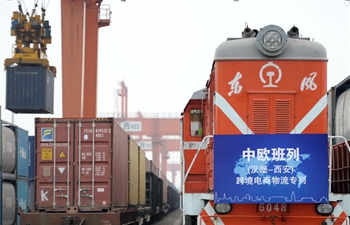SHANGHAI, May 22 (Xinhua) -- Shanghai cab driver Yao Yanjun's convenience store has been open for three months. It helps him bring in extra money to supplement his taxi income. Best of all, he doesn't even have to rent a storefront in the expensive Chinese metropolis.
The convenience store is in his cab. All the storage space in his car is filled with snacks, bottled water, soft drinks and other merchandise. Passengers who want to buy items can scan a QR code on the back of the driver's seat to pay for them.
The store is jointly owned by Yao's taxi company, Shanghai Haibo Taxi Co. Ltd. and convenience store chain Wangwang Convenience, with the latter responsible for logistics supply of the goods. Drivers like Yao share the earnings from retail sales.
More than 200 taxis in Shanghai have joined the retailing business. Yao said he was among the top 10 sellers in the first two months, with the sales adding 600 yuan (94 U.S. dollars) in March to his monthly income and 400 yuan in April.
Yao said the traditional taxi business has been struggling, with some 1,000 cabs in his taxi firm idle because of a lack of drivers.
The taxi company signed a cooperation agreement with the chain store operator to increase drivers' income.
Wangwang Convenience, registered in north China's Tianjin, is an online shopping platform for small shops. It provides "intelligent hardware and store solutions" for small retailers.
The company said it has also helped taxi companies open convenience stores in cabs in Nanjing, and is exploring the market in Hangzhou.
All items sold in the taxis are supplied by the store chain, which has a food business license. It has also bought passenger accident insurance and food safety insurance for the taxi retailing business.
However, the new business model is not without controversy. Li Shuguang, professor with Shanghai-based Fudan University, said taxis are transport carriers and are not covered by any food business laws or regulations.
There are also public concerns about driving safety as taxi drivers become retailers.
Yao said driving is his primary work, although he does give recommendations to passengers about items for sale. He said he has not had any experience with passengers stealing goods from his cab.
Many convenience store operators are seeing the potential of cabs as mobile retailers. Similar businesses have appeared in several Chinese cities. Some have refrigerators in the storage trunks of their taxis so that drivers can provide bar-like service. A firm in southwest China's Chengdu City even replaced the front passenger's seats in cabs with massage chairs so that cab drivers can charge additional fees.
Currently, the cities of Shenzhen and Wuhan have called for a stop to all retailing services in taxis.
Shanghai Food and Drug Administration said it is working on new supervision measures on food retailing in taxis. It said that the government would not just refuse a new type of business.

















